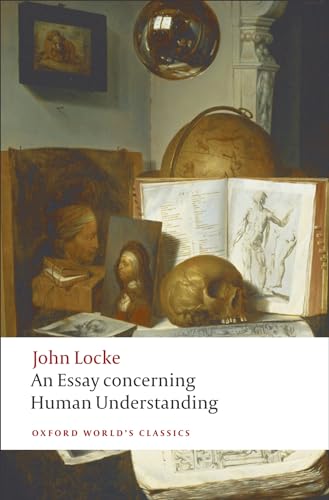
Sinossi
'I must apply my self to Experience; as far as that reaches, I may have certain Knowledge, but no farther.'
In An Essay concerning Human Understanding, John Locke sets out his theory of knowledge and how we acquire it. Eschewing doctrines of innate principles and ideas, Locke shows how all our ideas, even the most abstract and complex, are grounded in human experience and attained by sensation of external things or reflection upon our own mental activities. A thorough examination of the communication of ideas through language and the conventions of taking words as signs of ideas paves the way for his penetrating critique of the limitations of ideas and the extent of our knowledge of ourselves, the world, God, and morals.
Locke's masterpiece laid the foundation of British empiricism and is of enduring interest to anyone exploring the development of philosophical thought. This sensitive abridgement uses P. H. Nidditch's authoritative text, and together with an illuminating introduction and other features, makes Locke's arguments more accessible.
ABOUT THE SERIES: For over 100 years Oxford World's Classics has made available the widest range of literature from around the globe. Each affordable volume reflects Oxford's commitment to scholarship, providing the most accurate text plus a wealth of other valuable features, including expert introductions by leading authorities, helpful notes to clarify the text, up-to-date bibliographies for further study, and much more.
Le informazioni nella sezione "Riassunto" possono far riferimento a edizioni diverse di questo titolo.
Informazioni sull?autore
Pauline Phemister is Reader in Philosophy at the University of Edinburgh.
Le informazioni nella sezione "Su questo libro" possono far riferimento a edizioni diverse di questo titolo.
Altre edizioni note dello stesso titolo
Risultati della ricerca per An Essay concerning Human Understanding
An Essay Concerning Human Understanding (Oxford World's Classics)
Da: Orion Tech, Kingwood, TX, U.S.A.
paperback. Condizione: Fair. Codice articolo 0199296626-4-33837486
Compra usato
Quantità: 1 disponibili
An Essay concerning Human Unde
Da: World of Books (was SecondSale), Montgomery, IL, U.S.A.
Condizione: Good. Item in good condition. Textbooks may not include supplemental items i.e. CDs, access codes etc. Codice articolo 00091111208
Compra usato
Quantità: 1 disponibili
An Essay Concerning Human Understanding (Oxford World's Classics)
Da: Zoom Books East, Glendale Heights, IL, U.S.A.
Condizione: good. Book is in good condition and may include underlining highlighting and minimal wear. The book can also include "From the library of" labels. May not contain miscellaneous items toys, dvds, etc. . We offer 100% money back guarantee and 24 7 customer service. Codice articolo ZEV.0199296626.G
Compra usato
Quantità: 1 disponibili
An Essay Concerning Human Understanding (Oxford World's Classics)
Da: Goodwill Books, Hillsboro, OR, U.S.A.
Condizione: good. Signs of wear and consistent use. Codice articolo 3IIK3O005MNZ_ns
Compra usato
Quantità: 1 disponibili
An Essay Concerning Human Understanding
Da: ThriftBooks-Atlanta, AUSTELL, GA, U.S.A.
Paperback. Condizione: Good. No Jacket. Pages can have notes/highlighting. Spine may show signs of wear. ~ ThriftBooks: Read More, Spend Less. Codice articolo G0199296626I3N00
Compra usato
Quantità: 1 disponibili
An Essay Concerning Human Understanding (Oxford Worlds Classics)
Da: Lakeside Books, Benton Harbor, MI, U.S.A.
Condizione: New. Brand New! Not Overstocks or Low Quality Book Club Editions! Direct From the Publisher! We're not a giant, faceless warehouse organization! We're a small town bookstore that loves books and loves it's customers! Buy from Lakeside Books! Codice articolo OTF-9780199296620
Compra nuovo
Quantità: 2 disponibili
Essay Concerning Human Understanding
Da: GreatBookPrices, Columbia, MD, U.S.A.
Condizione: New. Codice articolo 5534407-n
Compra nuovo
Quantità: 1 disponibili
Essay Concerning Human Understanding
Da: GreatBookPrices, Columbia, MD, U.S.A.
Condizione: As New. Unread book in perfect condition. Codice articolo 5534407
Compra usato
Quantità: 1 disponibili
An Essay Concerning Human Understanding (Oxford World's Classics)
Da: California Books, Miami, FL, U.S.A.
Condizione: New. Codice articolo I-9780199296620
Compra nuovo
Quantità: 7 disponibili
An Essay concerning Human Understanding (Paperback)
Da: Grand Eagle Retail, Bensenville, IL, U.S.A.
Paperback. Condizione: new. Paperback. 'I must apply my self to Experience; as far as that reaches, I may have certain Knowledge, but no farther.' In An Essay concerning Human Understanding, John Locke sets out his theory of knowledge and how we acquire it. Eschewing doctrines of innate principles and ideas, Locke shows how all our ideas, even the most abstract and complex, are grounded in human experience andattained by sensation of external things or reflection upon our own mental activities. A thorough examination of the communication of ideas through language and the conventions of taking words as signs of ideas paves the way for his penetrating critique of the limitationsof ideas and the extent of our knowledge of ourselves, the world, God, and morals. Locke's masterpiece laid the foundation of British empiricism and is of enduring interest to anyone exploring the development of philosophical thought. This sensitive abridgement uses P. H. Nidditch's authoritative text, and together with an illuminating introduction and other features, makes Locke's arguments more accessible. ABOUT THE SERIES: For over 100 years Oxford World'sClassics has made available the widest range of literature from around the globe. Each affordable volume reflects Oxford's commitment to scholarship, providing the most accurate text plus a wealth ofother valuable features, including expert introductions by leading authorities, helpful notes to clarify the text, up-to-date bibliographies for further study, and much more. In his Essay, John Locke sets out his theory of knowledge and how we acquire it. He shows how all our ideas are grounded in human experience and analyses the extent of our knowledge of ourselves and the world. This new abridgement uses P. H. Nidditch's authoritative text to make an accessible edition of Locke's masterpiece. Shipping may be from multiple locations in the US or from the UK, depending on stock availability. Codice articolo 9780199296620
Compra nuovo
Quantità: 1 disponibili

